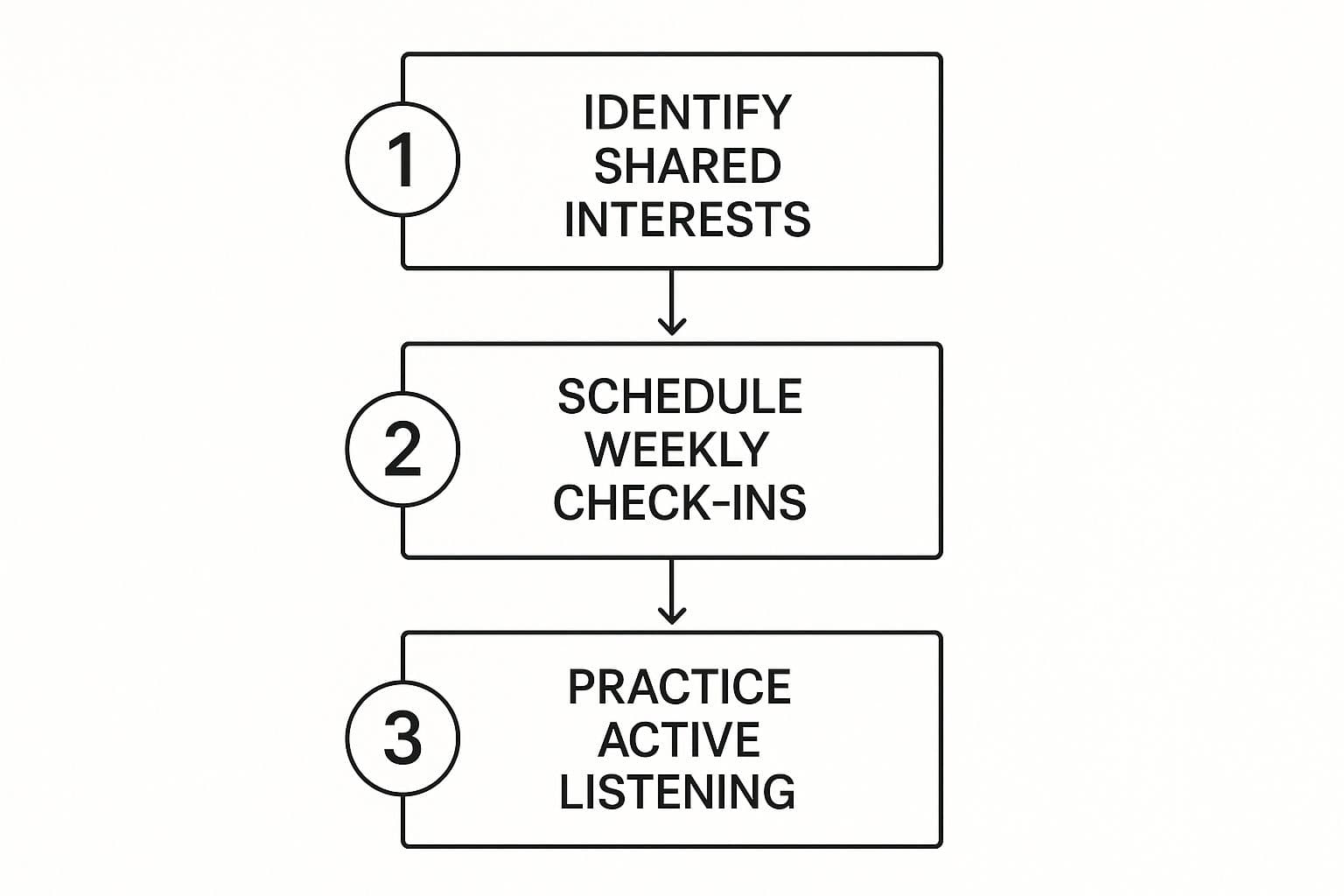Take a practical look at your relationship with a couple compatibility test that focuses on shared values, personality, and everyday habits. Whether you’re newly dating or have been together for years, this approach helps you prioritize what matters, open honest conversations, and build a stronger connection.
June 20, 2025 (8mo ago) — last updated December 13, 2025 (2mo ago)
Couple Compatibility Test: Values & Personality
Assess values, personality, and practical habits with a couple compatibility test—clear steps and conversation prompts to strengthen your relationship.
← Back to blog
Couple Compatibility Test: Assess Values & Personality
Summary: Take a couple compatibility test to evaluate values, personality, and practical habits—get clear steps to strengthen your relationship.
Introduction
Take a practical look at your relationship with a couple compatibility test that focuses on shared values, personality, and everyday habits. Whether you’re newly dating or have been together for years, this approach helps you prioritize what matters, open honest conversations, and build a stronger connection that lasts.
What Actually Makes Couples Compatible (Beyond Chemistry)
That initial spark of chemistry feels magical, but long-term partnership depends on what comes after the spark. Chemistry is like curb appeal; genuine compatibility is the foundation that keeps a house standing through life’s storms.
When you look past the butterflies, you’re checking the structural integrity of a partnership: the core elements that determine how two people build a life together, not just enjoy a great first date.
The Bedrock of True Compatibility
Lasting relationships aren’t built on sharing the same taste in movies or music. They rest on pillars that create shared purpose and direction. Reflect on these areas to see where you and your partner stand:
- Shared core values: It’s not about agreeing on every small thing, but being on the same page about family, integrity, career goals, and what it means to live a good life.
- Communication styles: Can you talk about hard topics without escalation? Couples who last listen, make each other feel heard, and work toward solutions even when they disagree.
- Conflict resolution: Arguments happen. The difference is how you argue. Is the goal to win, or to understand and resolve the issue so you can move forward together?6
- Emotional intimacy: Feeling safe enough to be vulnerable, and being seen, understood, and accepted for who you are.
Aligning Ideals with Reality
We all carry an image of an “ideal” partner, but matching that vision isn’t guaranteed. Research shows people are often happier when a partner’s traits align with stated preferences, so defining non‑negotiables is practical, not just wishful thinking2. Clarifying what matters most should be part of any couple compatibility test. For another layer of insight, explore birth‑date and life‑path connections in our guides on birth date compatibility and life path compatibility.
Testing Personality Compatibility That Actually Matters
Shared values build the foundation, and personality shapes the day-to-day. A practical couple compatibility test includes gentle conversations that reveal personality traits without turning date night into an exam.
Start with self‑awareness. Learn your own tendencies before you evaluate how you fit together — our guide on how to learn about yourself can help. The Big Five personality traits — openness, conscientiousness, extraversion, agreeableness, and neuroticism — are useful lenses for understanding long‑term compatibility2.
Key Personality Areas to Explore
Understanding these dimensions helps prevent friction later. For example, a highly conscientious partner who likes order may clash with a spontaneous, messy partner — this flags potential hotspots like chores and planning. Bringing this up early creates space for negotiation and compromise.
| Personality compatibility area | Key questions | Compatibility indicators |
|---|---|---|
| Social energy (Extraversion vs. Introversion) | How do you recharge after a long week? What does your ideal weekend look like? | Extroverts feel connected by social outings; introverts need quiet, one‑on‑one time. |
| Organization style (Conscientiousness) | Are you a planner or do you prefer to go with the flow? How do you feel about a messy kitchen? | Differences can cause friction; success comes from clear expectations and fair task divisions. |
| Emotional response (Neuroticism) | How do you react when stressed or overwhelmed? What’s your instinct in a crisis? | Knowing whether one partner needs space and the other needs to talk helps build a healthy conflict plan. |
| Openness to experience | How do you feel about trying new restaurants, traveling, or discussing abstract ideas? | Shared adventure or mutual appreciation for routine can strengthen bonds; differences add spice if respected. |
This table isn’t about scoring; it’s a dialogue starter. Observe how you each handle stress — that’s a real‑world compatibility test. Does one go quiet while the other needs to talk? Neither approach is wrong, but awareness helps you support one another.
The Fascinating Science of Genetic Compatibility
Beyond values and personality, biology may influence attraction. Research on human leukocyte antigen (HLA) genes, which are central to the immune system, suggests people can be subconsciously drawn to partners with different immune‑system genes, potentially promoting genetic diversity in offspring1.
From an evolutionary view, choosing a partner with different HLA genes can increase a child’s chance of resisting a wider range of illnesses. Some modern studies also link HLA differences with relationship satisfaction, though genetics is only one piece of a much larger puzzle.
Today’s genetic compatibility services typically require a saliva swab from each partner and analyze HLA profiles to estimate dissimilarity. It’s an interesting lens, but not a final answer — genes don’t tell you whether someone will share your long‑term goals or treat you kindly. See genetic compatibility as one of several tools alongside personality and values1.
Reality Check: What the Numbers Say About Your Dating Pool
Every preference you add — age range, education, distance — reduces your available dating pool. That’s not about lowering standards; it’s about making informed choices. Statistical tools show how strict filters affect your real odds of meeting someone who fits your criteria3.
The Math Behind Your Match List
You can quantify how preferences shape your dating life. Tools like the Keeper.AI dating‑pool calculator let you experiment with different criteria, and government demographic data provides the baseline population figures these tools rely on45.
To illustrate how restrictive preferences shrink your pool, here are estimated reductions based on metropolitan demographics and online‑dating behavior. These figures are directional, not exact predictions3.
| Preference category | Restrictive level | Estimated pool reduction |
|---|---|---|
| Age range | ±2 years | ~80–90% reduction |
| Height | 6′0" or taller (for men) | ~85% reduction |
| Education | Graduate degree or higher | ~88% reduction |
| Income | Top 10% | ~90% reduction |
| Political alignment | Must match exactly | ~50–60% reduction |
| Geography | Within a 10‑mile radius | ~95–98% reduction |
Layering a few of these preferences can shrink your potential matches dramatically. Expanding your age range, being open to a slightly longer commute, or prioritizing core values over surface‑level filters can increase your odds of finding a meaningful connection3.
Building Your Own Couple Compatibility Assessment
The most insightful couple compatibility test is one you design together. Skip generic quizzes and create questions that matter for your unique relationship. Think of it as creating a safe space for real conversation — whether you’re newly together or celebrating years as a couple.
Organize your life into three buckets: emotional, practical, and lifestyle. This ensures you cover key areas without getting stuck on superficial topics.
Designing Meaningful Questions
A good question opens the door to a story, not a yes‑or‑no answer. The goal is to understand the “why” behind your partner’s beliefs and habits.
- Emotional compatibility:
- “When you’re feeling down or stressed, what’s the most helpful thing someone can do for you?”
- “How do you define trust in a relationship, and what actions make you feel most secure?”
- Practical and financial compatibility:
- “Let’s pretend we just won $10,000. What’s your first instinct on what to do with it?”
- “What’s your take on debt — do you see it as a tool or something to avoid?”
- Lifestyle compatibility:
- “Describe your perfect Sunday. Are you chilling at home, out on an adventure, or catching up with family?”
- “What role does health and fitness play in your daily routine?”
Use these questions as conversation starters and schedule regular check‑ins to discuss what comes up. The infographic below summarizes a simple process for strengthening connection: identify shared interests, schedule weekly check‑ins, and practice active listening.

Making Sense of Your Compatibility Results
A test report is the beginning of a conversation, not a final verdict. Treat results as a map that shows smooth roads and potential bumps. If your scores show differences in financial priorities, use that as an invitation to have an honest money conversation now, before small issues become resentments.
Context Is Everything
Compatibility isn’t a single score. It’s a blend of psychological traits, shared interests, and social dynamics. A low score in one area can be balanced by strengths in others, like deeply aligned core values.
Use insights to understand your partner’s point of view and work together to bridge gaps. Proactive communication turns potential fights into moments of connection. Sometimes a little effort and compromise are enough; other times differences point to deeper incompatibilities you both need to consider6.
Growing Compatible: Building Long-Term Relationship Success
Finding someone you click with is just the first step. The secret to long-term success is actively building on compatibility. People change over time, and a relationship that once felt easy may need more intentional care to stay strong.
Think of your relationship like a garden: planting seeds isn’t enough — you need regular watering, weeding, and attention.
Strategies for Staying Connected
Couples who thrive are intentional about connection:
- Scheduled check‑ins: Set aside regular time to talk about your relationship — what’s working, what feels off, and how you can support each other.
- Constructive conflict: Address disagreements before they fester. Frame conversations around solutions rather than blame.
- Adapting to change: Accept that both of you will evolve and commit to growing together.
Small gestures matter. Thoughtful gifts, shared rituals, and acts of appreciation keep bonds strong. For gift ideas, see thoughtful options for couples in our curated collection: https://www.efytal.com/collections/gifts-for-couples.
Ultimately, a successful partnership is a choice you make every day. Focus on growth, communication, and mutual support to build a relationship that strengthens over time. Ready to explore deeper life‑path and compatibility insights? Download the Life Purpose App to learn more about your shared life path and values.
Quick Q&A — Common Questions About Couple Compatibility
Q: What should a couple compatibility test measure?
A: Shared core values, communication styles, conflict resolution, emotional intimacy, and practical habits like finances and household roles.
Q: Can personality differences be managed?
A: Yes. Awareness of differences — especially around stress response and organization — lets you create practical strategies like clear expectations and fair divisions of labor.
Q: Should I take genetic compatibility seriously?
A: Treat genetic results as one interesting data point, not a final answer. Genetics can inform attraction research, but values, trust, and communication determine long‑term success.
Discover Your Life Purpose Today!
Unlock your true potential and find your life’s purpose.
